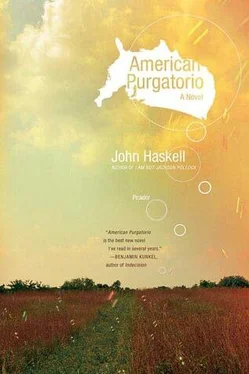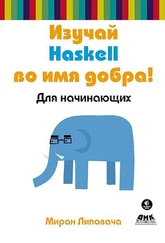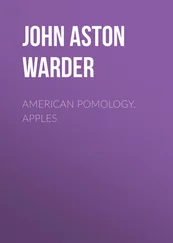John Haskell - American Purgatorio
Здесь есть возможность читать онлайн «John Haskell - American Purgatorio» весь текст электронной книги совершенно бесплатно (целиком полную версию без сокращений). В некоторых случаях можно слушать аудио, скачать через торрент в формате fb2 и присутствует краткое содержание. Год выпуска: 2006, Издательство: Picador, Жанр: Современная проза, на английском языке. Описание произведения, (предисловие) а так же отзывы посетителей доступны на портале библиотеки ЛибКат.
- Название:American Purgatorio
- Автор:
- Издательство:Picador
- Жанр:
- Год:2006
- ISBN:нет данных
- Рейтинг книги:3 / 5. Голосов: 1
-
Избранное:Добавить в избранное
- Отзывы:
-
Ваша оценка:
- 60
- 1
- 2
- 3
- 4
- 5
American Purgatorio: краткое содержание, описание и аннотация
Предлагаем к чтению аннотацию, описание, краткое содержание или предисловие (зависит от того, что написал сам автор книги «American Purgatorio»). Если вы не нашли необходимую информацию о книге — напишите в комментариях, мы постараемся отыскать её.
Los Angeles Times
American Purgatorio — читать онлайн бесплатно полную книгу (весь текст) целиком
Ниже представлен текст книги, разбитый по страницам. Система сохранения места последней прочитанной страницы, позволяет с удобством читать онлайн бесплатно книгу «American Purgatorio», без необходимости каждый раз заново искать на чём Вы остановились. Поставьте закладку, и сможете в любой момент перейти на страницу, на которой закончили чтение.
Интервал:
Закладка:
As I did in Cooperstown, New York.
We had taken a trip to the Baseball Hall of Fame, not that you were a baseball fan, but some friends of yours had given us a night at a bed-and-breakfast. There was a snowstorm outside and it was all amazing and wonderful and we never left the room. All that day was spent having sex, until we were numb from it, staying pretty much in or around the bed, eating and making love until, at a certain point, you were complete and I was also complete. We were both empty. And in that long breath of emptiness I felt, not the longing of wanting more, but the peace of wanting nothing.
Of course it wasn’t always pleasant. There was that time on Great Jones Street or Bond Street, off Lafayette. We’d gone to a bar after work, with friends, and you were more than a friend at that point but nervous enough about the relationship that you started drinking, we all started drinking, but you kept drinking so that when it was time to leave and we stood on the street, waiting for a cab, you’d left your coat inside. I went back to get it, found it on the floor, and when I brought it out, you were sitting on the curb, bent over, holding your head in your hands and throwing up all over the gutter. I went to you and tried to comfort you, but I didn’t know how to do it. I told someone to get some water. I put my hand on your forehead and then you threw up some more. Just an hour earlier you’d been feeling good and you wanted to feel a little more good, but that was too much, that more was too much. And now the more was gone. We took a cab home and riding in the cab, looking at your closed eyes, sympathetic or empathetic, I kissed your forehead which was hot, and your cheeks which were soft and round, and then your lips. I didn’t care about anything. I was kissing your mouth because it belonged to you.
* * *
All the time I was thinking this, the snowy-haired girl with the loose dress was talking, telling me where I was and what I had to do. She was speaking to me, but I was having a little trouble hearing her. A car was turning out of the parking lot and I was having trouble hearing her because I was paying attention to the shadows of the headlights playing across the canvas skin of the tent. I could see her, a partial silhouette, and I wanted to understand, and because what she was saying was still incomprehensible, I asked her to repeat.
But it wasn’t that I didn’t hear her words. I did. And it wasn’t that I didn’t understand their meaning. She was telling me to let go, and I couldn’t let go. I couldn’t stop what I was doing because it was what I had to do.
And of course I had reasons, in my mind, to discount what she was telling me. She was just a twenty-some-year-old imitation Indian shaman who didn’t know enough of life to tell me that my life, with my wife, was over.
And yet I suspected that she was probably right.
On the one hand I had a mind of my own, and on the other hand I had another mind, and I seemed to be somewhere between the two.
2
I could soak only so long, and once I’d left the thermal springs motel all I really remembered about the white-haired psychic girl was that she wore an Indian outfit and Indian jewelry. That became the clue, and as I drove out of the green valleys of Colorado and into the red canyons of the West, I was glad, first of all, to be moving, and second to be moving toward something vaguely Indian, and through that vague something Indian, to Anne.
Around midday I found a monument marker indicating an Indian cliff-dwelling site. I’d already driven past several Indian information centers, but something about the layout of the parking lot, convinced me to stop. I immediately noticed the dry quiet air. The sandstone walls rising up on either side of the canyon were streaked with red. I began hiking down the steps made of railroad ties, into a riverbed with cottonwood and chaparral and piñon pine. I wanted to see no people (meaning no white people) because I wanted to see and hear only what the ancient people who lived here had to tell me. This was their place and I didn’t know how they would speak to me but I was listening. To the birds flitting from branch to branch and the slow-moving stream. Even the delicate clouds, evaporating in the heat of the sun, seemed to be speaking.
Keet Seel is one of the more out-of-the-way cliff dwellings in northern Arizona, and I was alone when I got to the actual cliff, to the city that once existed in that cliff. The dwellings were made from the same red stone, built in the hollow where the cliff had fallen away, and now they were part of the cliff. I could see the actual mud mortar holding the buildings together, and I imagined the life of this village as it was when it was still alive, the women getting water, the men in their leather moccasins, not taking more than they needed, living with scarcity rather that constantly filling themselves with stuff. I was trying to make these dwellings in the desert stand for civilization or the effects of greed on civilization, but these people weren’t greedy. And yet at some point in the middle of their history they disappeared, and now even the remains of that history were crumbling back into the earth.
As I walked up a slope of fallen stone and adobe, I saw at the bottom of the talus, mixed in with the rubble, a small flat piece of something in the dirt. I picked it up. It was a piece of pottery, some part of a clay vessel with black and dark red markings, mostly worn away. I looked at the markings, just a couple of dark lines and a part of a triangle shape, and I held this clue like a talisman. With it I began searching for other shards that might fit together with my shard and make some sense. I was down on my hands and knees sifting through the rough red sand, holding my shard in one hand, digging with the other.
And then I heard a voice coming from somewhere in the dwelling above me. I followed the sound of the voice up into the first level of the building. I entered a miniature doorway at the base of the structure. I could see pieces of wood sticking out of the adobe walls; there was a ladder made of well-worn tree limbs. I climbed that and emerged in an open area. A round uncovered kiva was to my right and I didn’t climb any farther because I didn’t want to wear away the adobe. But I listened and as I listened I heard the voice, this time behind me. I turned, and the ranger, a woman ranger, was standing there.
“What’s that?” she said.
She was referring to the shard in my hand, the shard I’d found, and having found it, I wanted to keep it. I didn’t want to let go of it. I thought about running, that I could probably outrun the ranger, but then what? I’d have my piece of pottery but then what?
The ranger was tan, wearing sunglasses. I stepped forward and presented her with my piece of pottery.
And that was that. Until later, when I walked back to my car. I stopped at the trailhead, near some cottonwoods, and as I stood on the sand by the barely moving stream, I imagined that no more shards would ever be found, that my shard was the last shard and now it was gone and I’d never see it again. I wished I had looked at it more carefully. If only I’d had a little more time with the shard, maybe I could have deciphered what it meant, and what it might have meant to me if it were still mine.
3
I was traveling on the small roads now, meandering as much as I could so as to miss as little as possible. The hills of central Arizona aren’t treacherous, but some of them are steep, and I was winding my way up one of the steeper ones when I noticed the car starting to stall. Maybe it was the high altitude, or I was low on gas, or the engine was hot. Whatever it was, although it was sputtering, it didn’t die, and I made it to the top of the hill, to an Indian casino, and pulled into the parking area.
Читать дальшеИнтервал:
Закладка:
Похожие книги на «American Purgatorio»
Представляем Вашему вниманию похожие книги на «American Purgatorio» списком для выбора. Мы отобрали схожую по названию и смыслу литературу в надежде предоставить читателям больше вариантов отыскать новые, интересные, ещё непрочитанные произведения.
Обсуждение, отзывы о книге «American Purgatorio» и просто собственные мнения читателей. Оставьте ваши комментарии, напишите, что Вы думаете о произведении, его смысле или главных героях. Укажите что конкретно понравилось, а что нет, и почему Вы так считаете.











